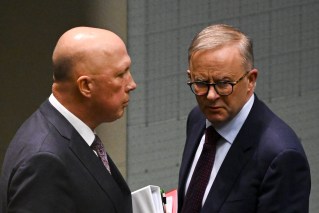Now for my next trick: Chalmers says his budget will ease inflation, but he’ll have to prove it
While the federal government says its budget will lower inflation, analysts counter that broad cost-of-living relief, such as energy rebates and tax cuts, could make things worse.

Federal Treasurer Jim Chalmers kisses wife Laura after handing down the 2024-25 Budget in the House of Representatives at Parliament House in Canberra, Tuesday, May 14, 2024. (AAP Image/Mick Tsikas) NO ARCHIVING
An expanded version of the energy-bill relief delivered in last year’s budget and another boost to Commonwealth Rent Assistance are expected to help tame the consumer price index.
Treasury forecasts in Tuesday night’s budget for 2024/25 show the cost-of-living measures will reduce inflation by about half a percentage point in the next financial year, possibly as early as Christmas.
Committee for Economic Development of Australia chief economist Cassandra Winzar said cost-of-living relief, including stage three tax cuts and energy bills support, that’s not means tested risks working against the central bank.
“Electricity rebates may alleviate headline inflation but will drive spending elsewhere,” Ms Winzar said.
Prime Minister Anthony Albanese and Treasurer Jim Chalmers
Treasurer Jim Chalmers and Prime Minister Anthony Albanese are spruiking the budget. (Mick Tsikas/AAP PHOTOS)
The stage three tax cuts take effect from July 1.
The government has earmarked $3.5 billion for the next 2024/25 financial year to give every Australian household $300 off their power bills.
Eligible small businesses will get slightly more relief, with $325 to be taken off their bills over the year.
Treasurer Jim Chalmers defended the government’s decision to provide cost-of-living relief for all Australians, not only low income households, pointing to Treasury’s forecast that it wouldn’t be inflationary.
“The clear advice we got from Treasury was that by designing our cost-of-living package the way we have will take the edge off inflation and won’t add to inflationary pressures elsewhere in the economy,” he said.
“We took that advice very seriously and we proceeded on that basis.”
Economist and budget expert Chris Richardson said the budget was expansionary, with $9.5 billion in new spending in the next 12 months.
“The government said it wouldn’t front-load stuff, it would be careful not to poke the inflationary bear, it would put it at the back – they have absolutely got it in the front,” he said.
The next federal election is due to be held by September 27, 2025.
Asked if wealthy households needed energy bill relief, Prime Minister Anthony Albanese said the government’s job was to get the fiscal settings right.
“This is the most efficient way to deliver it,” he told ABC television.
Business Council of Australia CEO Bran Black said he hoped Treasury’s prediction that inflation would fall by half a percentage point on the back of the cost of living relief turned out to be right.
“But we do note that when you’ve got more money in the economy, that means that there is the potential for people to be spending more and that can put pressure on inflation,” he added.
“We hope that that’s not the case, but we’re mindful that there is that risk.”
Annual inflation is running at 3.6 per cent.












